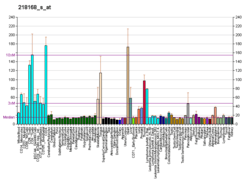ADCK3
aarF domain containing kinase 3 is a protein that in humans is encoded by the ADCK3 gene.[3]
This gene encodes a mitochondrial protein similar to yeast ABC1, which functions in an electron-transferring membrane protein complex in the respiratory chain. It is not related to the family of ABC transporter proteins. Expression of this gene is induced by the tumor suppressor p53 and in response to DNA damage, and inhibiting its expression partially suppresses p53-induced apoptosis. Alternatively spliced transcript variants have been found; however, their full-length nature has not been determined.[3]
References
External links
Further reading
- Lagier-Tourenne C, Tazir M, López LC, et al. (2008). "ADCK3, an ancestral kinase, is mutated in a form of recessive ataxia associated with coenzyme Q10 deficiency.". Am. J. Hum. Genet. 82 (3): 661–72. PMC 2427193
 . PMID 18319074. doi:10.1016/j.ajhg.2007.12.024.
. PMID 18319074. doi:10.1016/j.ajhg.2007.12.024.
- Mollet J, Delahodde A, Serre V, et al. (2008). "CABC1 gene mutations cause ubiquinone deficiency with cerebellar ataxia and seizures.". Am. J. Hum. Genet. 82 (3): 623–30. PMC 2427298
 . PMID 18319072. doi:10.1016/j.ajhg.2007.12.022.
. PMID 18319072. doi:10.1016/j.ajhg.2007.12.022.
- Gregory SG, Barlow KF, McLay KE, et al. (2006). "The DNA sequence and biological annotation of human chromosome 1.". Nature. 441 (7091): 315–21. PMID 16710414. doi:10.1038/nature04727.
- Kimura K, Wakamatsu A, Suzuki Y, et al. (2006). "Diversification of transcriptional modulation: large-scale identification and characterization of putative alternative promoters of human genes.". Genome Res. 16 (1): 55–65. PMC 1356129
 . PMID 16344560. doi:10.1101/gr.4039406.
. PMID 16344560. doi:10.1101/gr.4039406.
- Rual JF, Venkatesan K, Hao T, et al. (2005). "Towards a proteome-scale map of the human protein-protein interaction network.". Nature. 437 (7062): 1173–8. PMID 16189514. doi:10.1038/nature04209.
- Wan D, Gong Y, Qin W, et al. (2004). "Large-scale cDNA transfection screening for genes related to cancer development and progression.". Proc. Natl. Acad. Sci. U.S.A. 101 (44): 15724–9. PMC 524842
 . PMID 15498874. doi:10.1073/pnas.0404089101.
. PMID 15498874. doi:10.1073/pnas.0404089101.
- Gerhard DS, Wagner L, Feingold EA, et al. (2004). "The status, quality, and expansion of the NIH full-length cDNA project: the Mammalian Gene Collection (MGC).". Genome Res. 14 (10B): 2121–7. PMC 528928
 . PMID 15489334. doi:10.1101/gr.2596504.
. PMID 15489334. doi:10.1101/gr.2596504.
- Ota T, Suzuki Y, Nishikawa T, et al. (2004). "Complete sequencing and characterization of 21,243 full-length human cDNAs.". Nat. Genet. 36 (1): 40–5. PMID 14702039. doi:10.1038/ng1285.
- Strausberg RL, Feingold EA, Grouse LH, et al. (2003). "Generation and initial analysis of more than 15,000 full-length human and mouse cDNA sequences.". Proc. Natl. Acad. Sci. U.S.A. 99 (26): 16899–903. PMC 139241
 . PMID 12477932. doi:10.1073/pnas.242603899.
. PMID 12477932. doi:10.1073/pnas.242603899.
- Iiizumi M, Arakawa H, Mori T, et al. (2002). "Isolation of a novel gene, CABC1, encoding a mitochondrial protein that is highly homologous to yeast activity of bc1 complex.". Cancer Res. 62 (5): 1246–50. PMID 11888884.

 . PMID 18319074. doi:10.1016/j.ajhg.2007.12.024.
. PMID 18319074. doi:10.1016/j.ajhg.2007.12.024. . PMID 18319072. doi:10.1016/j.ajhg.2007.12.022.
. PMID 18319072. doi:10.1016/j.ajhg.2007.12.022. . PMID 16344560. doi:10.1101/gr.4039406.
. PMID 16344560. doi:10.1101/gr.4039406. . PMID 15498874. doi:10.1073/pnas.0404089101.
. PMID 15498874. doi:10.1073/pnas.0404089101. . PMID 15489334. doi:10.1101/gr.2596504.
. PMID 15489334. doi:10.1101/gr.2596504. . PMID 12477932. doi:10.1073/pnas.242603899.
. PMID 12477932. doi:10.1073/pnas.242603899.